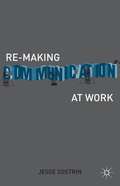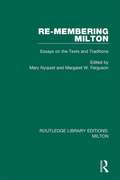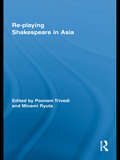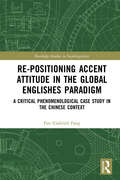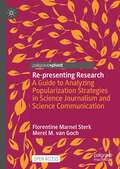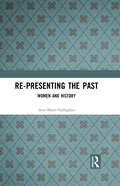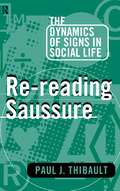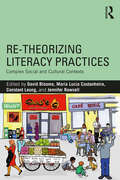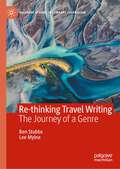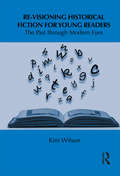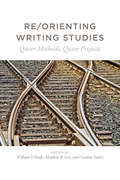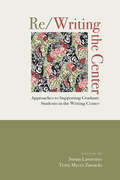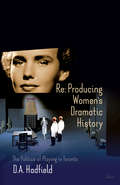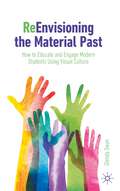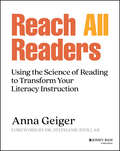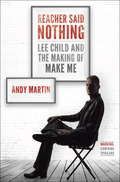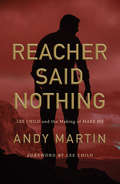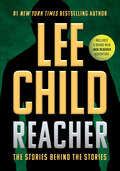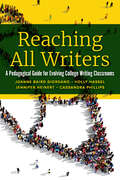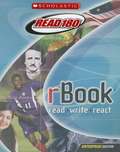- Table View
- List View
Re-making Communication At Work
by Jesse SostrinAlmost 400 years ago philosophers John Locke and David Hume implicitly defined communication as a tool for the transmission of pure ideas, stating that the ideas themselves are what matter, not the way in which they are expressed and exchanged. Now known as the transmission model, this form of communication is still the foundation for academic courses in communication theory and practice, and is embedded in most business literature and education that address subjects related to workplace communication, organization behavior and culture, leadership, and conflict resolution. But what if this accepted model of communication was incomplete? Re-Making Communication at Work argues that the transmission model of communication needs to be replaced by a new approach to communication. Sostrin challenges the status quo by exposing the most common myths that inaccurately define successful communication at work. These misperceptions are replaced by a set of core principles that deliver a clear mandate for re-making communication at work. Sostrin not only provides the theoretical foundation for this new approach, but he uses a straightforward model and exercises that demonstrate how managers, students, and consultants can powerfully improve relationships, decision-making, and collaboration with a few lines and circles.
Re-membering Milton: Essays on the Texts and Traditions (Routledge Library Editions: Milton #8)
by Mary Nyquist Margaret W. FergusonFirst published in 1987. Passionately praised and equally passionately criticised by contemporary and later writers, the figure of Milton inherited by the twentieth century is by no means unified, despite the appearance of monumental unity his work sometimes acquires in the classroom and in academic criticism. This collection of essays gathers together disparate and often conflicting representations of Milton as author and cultural figure. Critics familiar with the traditions of Milton scholarship and with debates in literary theory reconstruct Milton from evidence provided by his own prose and poetry, by his contemporaries (including some little-known women writers), by Romantics such as Blake and Wordsworth, and, finally, by a tradition of Afro-American writing that reflects Milton's influence in ways previously unexamined by critics. The process of reconstruction can also be seen as a process of "re-membering." The volume draws inspiration from, but also interrogates, the figure used in Areopagita to describe the quest for truth. Likening Truth to the dismembered body of Osiris, Milton urges Truth's friends to seek up and down, gathering "limb by limb" the body scattered through time and space. Re-membering Milton includes work by established critics from both sides of the Atlantic. Together these contributors place Milton and different Milton traditions firmly within the arenas of modem critical debate. As a result, the collection will be of interest to a wide range of readers: scholars concerned with Milton and Renaissance literature and history; advanced undergraduates and graduate students; researchers in women’s studies; and all readers generally concerned with trends in literary and cultural theory.
Re-playing Shakespeare in Asia
by Poonam Trivedi Minami RyutaIn this critical volume, leading scholars in the field examine the performance of Shakespeare in Asia. Emerging out of the view that it is in "play" or performance, and particularly in intercultural / multicultural performance, that the cutting edge of Shakespeare studies is to be found, the essays in this volume pay close attention to the modes of transference of the language of the text into the alternative languages of Asian theatres; to the history and politics of the performance of Shakespeare in key locations in Asia; to the new Asian experimentation with indigenous forms via Shakespeare and the consequent revitalizing and revising of the traditional boundaries of genre and gender; and to Shakespeare as a cultural capital world wide. Focusing specifically on the work of major directors in the central and emerging areas of Asia – Japan, China, India, Korea, Taiwan, Singapore, Indonesia and the Philippines - the chapters in this volume encompass a broader and more representative swath of Asian performances and locations in one book than has been attempted till now.
Re-positioning Accent Attitude in the Global Englishes Paradigm: A Critical Phenomenological Case Study in the Chinese Context (Routledge Studies in Sociolinguistics)
by Fan (Gabriel) FangThis book revisits the issue of China English as a developing variety of English and scrutinises students’ and teachers’ attitudes towards their own and other English accents from the critical phenomenological perspective of Global Englishes (GE) in the Chinese context. The research contributes to the field of GE by proposing a model of pronunciation teaching called ToPIC (Teaching of Pronunciation for Intercultural Communication) informed by interculturally responsive language pedagogy. Combining theory and empirical data, the book presents ground-breaking research on accent attitudes in the Chinese context within the GE paradigm and raises issues and concerns regarding teaching English, particularly speaking and pronunciation, from the GE perspective. Unpacking attitudes towards English accents from a critical perspective, this book will both show policy makers the need to consider the impacts of GE and help practitioners and language learners re-evaluate the goals and needs of English learning. The ToPIC approach also has significance for curriculum reform as it readdresses various issues in language policy and practice. The ToPIC approach is recommended for those interested in teaching and learning English in the expanding circle context and those seeking to learn more about learning and using English across the world.
Re-presenting Research: A Guide to Analyzing Popularization Strategies in Science Journalism and Science Communication
by Florentine Marnel Sterk Merel M. van GochThis open access book focuses on the textual features, or ‘strategies’, which form popularization discourse. In popularization discourse, research findings from academia are re-presented to make them noteworthy to society and influential for everyday life. Popularization involves recontextualization, or reimagination of findings in an everyday and newsworthy context, and reformulation, the use of audience-appropriate language to increase text comprehension and engagement. ‘Re-presenting research’ presents an empirically grounded, analytic framework for the analysis of popularization texts. Its applicability spans across disciplinary, multidisciplinary, and interdisciplinary fields, and overarches science communication, science journalism, and research communication. The book offers theoretical background information on popularization discourse, empirical underpinning of the construction of the framework, and practical applicability in examples from multiple text types and academic fields. This book acts as a guide for those working with or on popularization discourse – whether it is to analyze it or learn about it.
Re-presenting the Past: Women and History
by Louise Ryan Ann-Marie Gallagher Cathy LubelskaFeminist history continues to change the way history is written, and in doing so changes our view of the past. The authors of this collection explore how issues of sexuality, class, nationalism and colonialism informed the ways in which women were represented and continue to be represented in history. They show the ways in which women have been excluded, silenced and misrepresented in stories of the past, and how women's lives have been distorted or simplified in conventional historical accounts. Together, they suggest fresh ways of approaching women's history, and use examples of work in new areas of research such as women's health and leisure in order to demonstrate the effectiveness of the various methodologies being proposed.
Re-presenting the Past: Women and History
by Louise Ryan Ann-Marie Gallagher Cathy LubelskaFeminist history continues to change the way history is written, and in doing so changes our view of the past. The authors of this collection explore how issues of sexuality, class, nationalism and colonialism informed the ways in which women were represented and continue to be represented in history. They show the ways in which women have been excluded, silenced and misrepresented in stories of the past, and how women's lives have been distorted or simplified in conventional historical accounts. Together, they suggest fresh ways of approaching women's history, and use examples of work in new areas of research such as women's health and leisure in order to demonstrate the effectiveness of the various methodologies being proposed.
Re-reading Saussure: The Dynamics of Signs in Social Life
by Paul J. ThibaultThrough a detailed re-reading of Saussures's work in the light of contemporary developments in the human, life and physical sciences, Paul Thibault provides us with the means to redefine and refocus our theories of social meaning-making. Saussure's theory of language is generally considered to be a formal theory of abstract sign-types and sign-systems, separate from our individual and social practices of making meaning. In this challenging book, Thibault presents a different view of Saussure. Paying close attention to the original texts, including the Cours de Linguistic Generale he demonstrates that Saussure was centrally concerned with trying to formulate a theory of how meanings are made.Re-reading Saussure does more than simply engage with Saussure's theory in a new and up-to-date way, however. In addition to demonstrating the continuing viability of Saussure's thinking through a range of examples, it makes an important intervention in contemporary linguistic and semiotic debate.
Re-theorizing Literacy Practices: Complex Social and Cultural Contexts
by Constant Leung Jennifer Rowsell David Bloome Maria Lucia CastanheiraMoving beyond current theories on literacy practices, this edited collection sheds new light on the complexities inherent to the social, cultural, and ideological contexts in which literacy practices are realized. Building on Brian V. Street’s scholarship, contributors discuss literacy as intrinsically social and ideological, and examine how the theorizing of literacy practices has evolved in recognition of the diverse contexts in which written language is used. Breaking new intellectual and theoretical ground, this book brings together leading literacy scholars to re-examine how educational and sociocultural contexts frame and define literacy events and practices. Drawing from the richness of Brian V. Street’s work, this volume offers insights into fractures, tensions, and developments in literacy for scholars, students, and researchers.
Re-thinking Travel Writing: The Journey of a Genre (Palgrave Studies in Literary Journalism)
by Lee Mylne Ben StubbsThis book stems from the question that we as co-authors grappled with for the past 3-plus years while in our own periods of stasis during the pandemic: What place does the travel writing genre hold in a post-COVID world? With the massive interruptions to travel and travel writing across 2020-2023 as the pandemic forced us indoors and into isolation, it also raised many other pertinent questions about the practice of and future of travel writing. Part of the prompt for this book comes from the post-pandemic assumption that in an ecologically fraught, less mobile, and more uncertain world, there may not be a place for travel writing as we know it to exist in any meaningful way. We examine the problems and solutions apparent for travel writing as it engages with a period of re-thinking, prompted by the pandemic, though necessary for a plethora of other reasons as well. As academics and travel writing practitioners, with decades of experience in the field, we offer a unique perspectiveon this topic – as we have the in-the-field experience of professional travel writers, and we have the academic grounding to better understand the history, theoretical concerns and contradictions of the genre to provide a more in-depth perspective to our travel writing colleagues. This grounding allows us to access a unique and valuable perspective for Re-thinking Travel Writing: The Journey of a Genre for academics, aspiring travel writers and contemporary colleagues in the field.
Re-visioning Historical Fiction for Young Readers: The Past through Modern Eyes (Children's Literature and Culture)
by Kim WilsonThis study is concerned with how readers are positioned to interpret the past in historical fiction for children and young adults. Looking at literature published within the last thirty to forty years, Wilson identifies and explores a prevalent trend for re-visioning and rewriting the past according to modern social and political ideological assumptions. Fiction within this genre, while concerned with the past at the level of content, is additionally concerned with present views of that historical past because of the future to which it is moving. Specific areas of discussion include the identification of a new sub-genre: Living history fiction, stories of Joan of Arc, historical fiction featuring agentic females, the very popular Scholastic Press historical journal series, fictions of war, and historical fiction featuring multicultural discourses. Wilson observes specific traits in historical fiction written for children — most notably how the notion of positive progress into the future is nuanced differently in this literature in which the concept of progress from the past is inextricably linked to the protagonist’s potential for agency and the realization of subjectivity. The genre consistently manifests a concern with identity construction that in turn informs and influences how a metanarrative of positive progress is played out. This book engages in a discussion of the functionality of the past within the genre and offers an interpretative frame for the sifting out of the present from the past in historical fiction for young readers.
Re/Orienting Writing Studies: Queer Methods, Queer Projects
by Pamela Takayoshi Stacey Waite Chanon Adsanatham Jean Bessette Nicole I. Caswell Michael J. Faris Hillery Glasby Deborah Kuzawa Maria Novotny G Patterson Stephanie West-PuckettRe/Orienting Writing Studies is an exploration of the intersections among queer theory, rhetoric, and research methods in writing studies. Focusing careful theoretical attention on common research practices, this collection demonstrates how queer rhetorics of writing/composing, textual analysis, history, assessment, and embodiment/identity significantly alter both methods and methodologies in writing studies. The chapters represent a diverse set of research locations and experiences from which to articulate a new set of innovative research practices. While the humanities have engaged queer theory extensively, research methods have often been hermeneutic or interpretive. At the same time, social science approaches in composition research have foregrounded inquiry on human participants but have often struggled to understand where lesbian, gay, bisexual, transgender, and queer people fit into empirical research projects. Re/Orienting Writing Studies works at the intersections of humanities and social science methodologies to offer new insight into using queer methods for data collection and queer practices for framing research. Contributors: Chanon Adsanatham, Jean Bessette, Nicole I. Caswell, Michael J. Faris, Hillery Glasby, Deborah Kuzawa, Maria Novotny, G Patterson, Stacey Waite, Stephanie West-Puckett
Re/Writing the Center: Approaches to Supporting Graduate Students in the Writing Center
by Susan Lawrence Terry Myers ZawackiRe/Writing the Center illuminates how core writing center pedagogies and institutional arrangements are complicated by the need to create intentional, targeted support for advanced graduate writers. Most writing center tutors are undergraduates, whose lack of familiarity with the genres, preparatory knowledge, and research processes integral to graduate-level writing can leave them underprepared to assist graduate students. Complicating the issue is that many of the graduate students who take advantage of writing center support are international students. The essays in this volume show how to navigate the divide between traditional writing center theory and practices, developed to support undergraduate writers, and the growing demand for writing centers to meet the needs of advanced graduate writers. Contributors address core assumptions of writing center pedagogy, such as the concept of peers and peer tutoring, the emphasis on one-to-one tutorials, the positioning of tutors as generalists rather than specialists, and even the notion of the writing center as the primary location or center of the tutoring process. Re/Writing the Center offers an imaginative perspective on the benefits writing centers can offer to graduate students and on the new possibilities for inquiry and practice graduate students can inspire in the writing center. Contributors: Laura Brady, Michelle Cox, Thomas Deans, Paula Gillespie, Mary Glavan, Marilyn Gray, James Holsinger, Elena Kallestinova, Tika Lamsal, Patrick S. Lawrence, Elizabeth Lenaghan, Michael A. Pemberton, Sherry Wynn Perdue, Doug Phillips, Juliann Reineke, Adam Robinson, Steve Simpson, Nathalie Singh-Corcoran, Ashly Bender Smith, Sarah Summers, Molly Tetreault, Joan Turner, Bronwyn T. Williams, Joanna Wolfe
Re: Producing Women's Dramatic History
by D. A. HadfieldWithin the last generation, Canadian drama, like other literary forms, has seen the emergence of works by women that re-vision the role of women in history. However, in order to write themselves into theatre history, women have had to negotiate a complex journey through both pages and stages, a network of public production that is highly politically charged at every turn. This book examines the strategies employed by seven feminist productions that have managed to achieve a canonic place in the recorded history of Canadian theatre. All of the plays under consideration here exist (or have existed) in at least one published script form. However, Dorothy Hadfield’s purpose here is not to analyze these scripts for the definitive meaning of the narratives in these plays, nor is she trying to suggest how a reader or audience should inevitably read them. Instead, Hadfield is trying to account for how and why these scripts came to exist in published form, given the strong implicit connection between publication and a public assumption of "good” or "successful” theatre. In a system where textual visibility leads to opportunities for study, reproduction and validation for both play and playwright, the permanence of script publication can have real economic and ideological advantages. By analyzing publicity materials, photos, programs, reviews, box office and theatre records, it is possible to trace the process of creating a theatrical "success,” as well as to assess what effect that critical verdict has on the shape of the script publications of these works. In effect, by placing the textual artifacts left behind by these performances in the context of their production and reception, in part through a carefully constructed ideological compatibility throughout the production process, it is possible to investigate how the politics of the theatrical process influences what we perceive as "good” playwriting.
ReEnvisioning the Material Past: How to Educate and Engage Modern Students Using Visual Culture
by Glenda SwanThis book is designed to help instructors effectively incorporate images and other aspects of material culture into their pedagogy in an engaging and relatable manner. The author draws on her personal experiences as an art historian of ancient art who instructs a wide variety of undergraduates. In addition to helping students to look and think critically, the book explores how the material culture of the past can be a potent tool in motivating student involvement with course content and sharpening skills vital for navigating contemporary culture.
Reach All Readers: Using the Science of Reading to Transform Your Literacy Instruction
by Anna GeigerThe essential guide to teaching literacy skills to K-3 students Reach All Readers is filled with practical tools for every kindergarten and early grade educator. This book addresses the science behind how students learn to read and how educators can apply this information in their classrooms every day. It is jam packed with research on literacy, spelled out in an easy-for-anyone-to-understand way. You'll also find evidence-based routines and activities to apply in the classroom. Learn the “how” of teaching literacy, and gain an understanding of why these approaches work. Charts and graphics illustrate concepts, so you can visualize how the big picture connects to practical applications and approaches. With Reach All Readers, teaching literacy is a breeze! This reader-friendly guide to the science of reading education will help you improve your reading instruction with research-backed strategies. Literacy expert Anna Geiger breaks down complex concepts and presents them in an easy-to-digest format. Then, she offers concrete ideas you can implement immediately. Get all the must-know information about K-3 literacy education in one place Understand the latest research on how students learn and get tools for putting that research into practice Follow concrete lesson plans and practical tips to level up your literacy teaching Develop a big-picture understanding of literacy education so you know how best to help each and every student Anyone responsible for teaching K-3 students reading, writing, and literacy skills—including teachers, homeschoolers, tutors, parents, and administrators—will want a copy of Reach All Readers.
Reach: Practice Book
by Deborah J. Short Lada Kratky Nonie K. Lesaux Nancy Frey Sylvia Linan ThompsonThis practice book features student activities for skills practice in vocabulary, language, grammar, reading, and fluency.
Reacher Said Nothing
by Andy MartinFans of Lee Child know well that the muscular star of his bestselling novels, Jack Reacher, is a man of few words--and a lot of action. In Reacher Said Nothing, Andy Martin shadows Child like a literary private eye in a yearlong investigation of what it takes to make fiction's hottest hero hit the page running. The result is a fascinating, up-close-and-personal look into the world and ways of an expert storyteller's creative process as he undertakes the writing of the much anticipated twentieth Jack Reacher novel, Make Me. Fueled by copious mugs of black coffee, Lee Child squares off against the blank page (or, rather, computer screen), eager to follow his wandering imagination in search of a plot worthy of the rough and ready Reacher. While working in fits and starts, fine-tuning sentences, characters, twists and turns, Child plies Martin with anecdotes and insights about the life and times that shaped the man and his methods: from schoolyard scraps and dismal factory jobs to a successful TV production career and the life-changing decision to put pencil to paper. Then there's the chance encounter that transformed aspiring author James Grant into household name "Lee Child." And between bouts at the keyboard in an office high above Manhattan, there are jaunts to writers' conventions, book signings, publishing powwows, chat shows, the Prado in Madrid, American diners, and English pubs. "Can I--the storyteller--get away with this?" Lee Child ponders, as he hones and hammers his latest nail-biter into fighting trim. Numerous bestsellers and near worldwide fame say he can. Jack Reacher may be a man of few words, but Reacher Said Nothing says it all about a certain tall man with a talent for coming out on top.Advance praise for Reacher Said Nothing "Andy Martin is no mere 'Reacher Creature,' as fans of Lee Child's Jack Reacher are known. He's something of a Reacher Teacher. Martin's book is the perfect accompaniment to all things Reacher. It explores, it explains, and it entertains. Like a detective novel, Reacher Said Nothing takes you down alleys and lanes and streets cast in shadow--but the journey isn't urban, it's in the boulevards and byways between your own ears. Andy's writing is a brainiac's delight."--Sam Fussell, author of Muscle"One-of-a-kind . . . It's funny, serious, a kind of mock-heroic and heroic together. It's quizzical and respectful, sophisticated and self-deprecating."--Dame Gillian BeerFrom the Hardcover edition.
Reacher Said Nothing: Lee Child and the Making of Make Me
by Andy MartinIt had never been attempted before, and might never be done again. One man watching another man write a novel from beginning to end. On September 1, 2014, in an 11th floor apartment in New York, Lee Child embarked on the twentieth book in his globally successful Jack Reacher series. Andy Martin was there to see him do it, sitting a couple of yards behind him, peering over his shoulder as the writer took another drag of a Camel cigarette and tapped out the first sentence: “Moving a guy as big as Keever wasn’t easy.” Miraculously, Child and Martin stuck with it, in tandem, for the next 8 months, right through to the bitter-sweet end and the last word, “needle”. Reacher Said Nothing is a one-of-a-kind meta-book, an uncompromising account in real time of the genesis, evolution and completion of a single work, Make Me. While unveiling the art of writing a thriller Martin also gives us a unique insight into the everyday life of an exemplary writer. From beginning to end, Martin captures all the sublime confidence, stumbling uncertainty, omniscience, cluelessness, ecstasy, despair, and heart-thumping suspense that go into writing a number-one bestseller.
Reacher: The Stories Behind the Stories
by Lee ChildLee Child tells the stories behind the stories from the bestselling Jack Reacher novels. Includes a new, never-before-seen Reacher tale. After making his debut in 1997’s The Killing Floor, Jack Reacher has quickly become one of the most popular—and most enduring—fictional heroes to emerge in the past half century. Now, his creator tells the stories behind the stories. These are the origin tales of all of the Reacher novels written solely by Lee Child, chock full of colorful anecdotes and intriguing inspirations. One by one, they expand upon each novel and place it in the context not only of the author’s life, but of the world outside the books. And taken together, they chart the rise of an action icon, from 1999’s The Killing Floor to 2019’s Blue Moon. An afterword by crime fiction expert and bookseller Otto Penzler considers the importance of the character and novels in the canon of contemporary crime fiction. In addition to the essays, this collection also includes an original Reacher short story—the first new Reacher appearance entirely written by Lee Child since 2019. Entertaining and enlightening, Reacher: The Stories Behind the Stories is a must-read for fans of the Jack Reacher series and a capstone to any collection of this excellent author.
Reaching All Writers: A Pedagogical Guide for Evolving College Writing Classrooms
by Holly Hassel Joanne Baird Giordano Jennifer Heinert Cassandra PhillipsReaching All Writers brings together decades of writing studies experience, research, and scholarship to help organize first-year writing courses around inclusive teaching practices and foundational concepts that support disciplinary learning for all college writers, including students who have been excluded from more selective higher-education institutions. Using threshold concepts and transfer as a foundation, the authors provide an invaluable resource for multiple contexts: instructors working off the tenure track and/or at multiple institutions; two-year college programs without a writing program administrator; and writing program graduate teaching assistant training courses. Each chapter includes an overview of a threshold concept, disciplinary background readings, practical teaching strategies, assignment and learning activity ideas, assessment principles, examples from student and instructor perspectives, and questions for reflection and discussion. Reaching All Writers describes effective teaching practices to help all college writing instructors, regardless of their institutional contexts, make changes that support equitable and inclusive learning opportunities—with a focus on teaching students whose backgrounds and learning experiences are different from those with more educational or economic privilege. Both new and experienced teachers adapting first-year college writing courses will find the book’s blend of practical strategies and disciplinary knowledge a useful companion for facilitating new classroom and program needs or designing new teaching assistant training courses.
Read 180 rBook, Stage B
by ScholasticThis book is a rich learning resource to improve the analytical thinking ability of the students.
Read 180: Rbook Flex
by Scholastic StaffA student workbook that provides instruction in reading comprehension, vocabulary, and writing and grammar skills.
